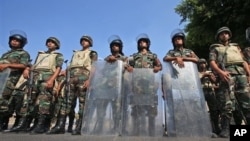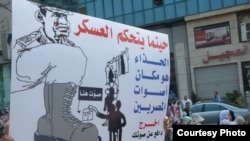CAIRO —
Story continues beneath photo gallery
Dueling demonstrations
But the Muslim Brotherhood is rejecting calls by Egypt's interim president Adly Mansour to negotiate an end to the protests and join the new interim government.
Instead, for more than two weeks, they have staged sit-ins outside Rabaa al Adaweyeh mosque in Cairo's Nasr city, where hundreds of people, mostly men, sleep on mats laid out on the streets and sidewalks in the shade of sagging tents. Brotherhood leaders say they will keep up their campaign of civil protest until their demands are met.
Across the city in Tahrir Square, anti-Morsi protestors are just as nationalistic and determined to keep the Islamist leader out of power.
Also angry at what they see as a minority group trying to impose its ideology on Egypt, but also rallied by the military's support for their cause, they are convinced they have won the country back.
In the more festive atmosphere of Tahrir, huge cheers erupt from the square when military helicopters and jets streak through the skies above. Throughout the day, Egyptian F-16 fighter jets flew over the capital to celebrate the 40th anniversary of the 1973 Yom Kippur War against Israel. Pro-government supporters dubbed their rally the “Friday of Victory,” alluding to the 1973 war.
While security forces have fought hard to keep the two groups of demonstrators from confronting each other, July 8 clashes between the military and Muslim Brotherhood supporters left more than 50 dead.
Chaos leads to unease
During the day, while most people are busy at work or shopping and going about their daily lives, the sense of unease grows in the capital, where constant tension, bouts of violence and political uncertainty is taking its toll.
New York-based Human Rights Watch has been investigating reports of torture at Muslim Brotherhood protest sites, of sectarian killings of Coptic Christians, and of abuse of force by the military authorities.
Shop managers say they are tired of the violence. Tour operators, camel-ride owners, souvenir sellers and restaurant owners say business has dropped off dramatically in the past year, and the new round of protests is keeping badly needed tourist money away.
According to political scientist Hassan Nafaa of Cairo University, the country is trapped in an ideological and political deadlock, and so far neither side has a clear strategy on how to end the polarization.
"If the Muslim Brothers choose a confrontation strategy, they are the losers — the big losers — because the army and the people are unified together against the Muslim Brothers right now," he says. "If the Brotherhood continues its policy of confrontation, they will lose, but the price might be very high."
Edward Yeranian contributed to this report.
Tens of thousands of supporters of ousted president Mohamed Morsi filled the streets of Cairo Friday, demanding the Islamist leader be returned to power. Waving the Egyptian flag and holding up posters, they marched through the summer heat shouting "Morsi is our President!" and "Egypt is Islamic," vowing to die for their cause.
Organized by the Muslim Brotherhood — a group that was banned until the 2011 revolution that toppled former president Hosni Mubarak — the protestors are furious at what they call a military power grab at the expense of democracy.
Their demonstrations are getting bigger, and their slogans more adamant.
One young student marching in downtown Cairo, Mahmoud Tahir, grabbed a bullhorn to lead shouts against Army chief Abdel Fattah el-Sissi, whom the Brotherhood calls a traitor.
Organized by the Muslim Brotherhood — a group that was banned until the 2011 revolution that toppled former president Hosni Mubarak — the protestors are furious at what they call a military power grab at the expense of democracy.
Their demonstrations are getting bigger, and their slogans more adamant.
One young student marching in downtown Cairo, Mahmoud Tahir, grabbed a bullhorn to lead shouts against Army chief Abdel Fattah el-Sissi, whom the Brotherhood calls a traitor.
Story continues beneath photo gallery
Saying that it only responded to the will of the people, Egypt's military ousted Morsi on July 3. Since then, the former leader has been held at an undisclosed location despite calls for his release by the United States and the European Union.
Dueling demonstrations
But the Muslim Brotherhood is rejecting calls by Egypt's interim president Adly Mansour to negotiate an end to the protests and join the new interim government.
Instead, for more than two weeks, they have staged sit-ins outside Rabaa al Adaweyeh mosque in Cairo's Nasr city, where hundreds of people, mostly men, sleep on mats laid out on the streets and sidewalks in the shade of sagging tents. Brotherhood leaders say they will keep up their campaign of civil protest until their demands are met.
Across the city in Tahrir Square, anti-Morsi protestors are just as nationalistic and determined to keep the Islamist leader out of power.
Also angry at what they see as a minority group trying to impose its ideology on Egypt, but also rallied by the military's support for their cause, they are convinced they have won the country back.
In the more festive atmosphere of Tahrir, huge cheers erupt from the square when military helicopters and jets streak through the skies above. Throughout the day, Egyptian F-16 fighter jets flew over the capital to celebrate the 40th anniversary of the 1973 Yom Kippur War against Israel. Pro-government supporters dubbed their rally the “Friday of Victory,” alluding to the 1973 war.
While security forces have fought hard to keep the two groups of demonstrators from confronting each other, July 8 clashes between the military and Muslim Brotherhood supporters left more than 50 dead.
Chaos leads to unease
During the day, while most people are busy at work or shopping and going about their daily lives, the sense of unease grows in the capital, where constant tension, bouts of violence and political uncertainty is taking its toll.
New York-based Human Rights Watch has been investigating reports of torture at Muslim Brotherhood protest sites, of sectarian killings of Coptic Christians, and of abuse of force by the military authorities.
Shop managers say they are tired of the violence. Tour operators, camel-ride owners, souvenir sellers and restaurant owners say business has dropped off dramatically in the past year, and the new round of protests is keeping badly needed tourist money away.
According to political scientist Hassan Nafaa of Cairo University, the country is trapped in an ideological and political deadlock, and so far neither side has a clear strategy on how to end the polarization.
"If the Muslim Brothers choose a confrontation strategy, they are the losers — the big losers — because the army and the people are unified together against the Muslim Brothers right now," he says. "If the Brotherhood continues its policy of confrontation, they will lose, but the price might be very high."
Edward Yeranian contributed to this report.






